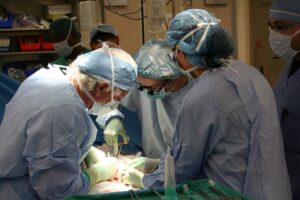
MINNEAPOLIS/ST. PAUL (09/10/2025) — New research from the University of Minnesota Medical School sheds light on the persistent impact of COVID-19 on cancer patients, revealing that the virus can linger in the body long after initial infection. The study, recently published in iScience, highlights the potential complications for cancer patients undergoing treatment.
During the height of the COVID-19 pandemic in 2020, medical professionals were particularly concerned about cancer patients who contracted the virus and subsequently developed severe inflammatory reactions, resembling autoimmune conditions. To delve deeper into this phenomenon, researchers focused on three cancer patients who had undergone transplant therapies and were hospitalized with severe COVID-19 infections.
Key Findings and Implications
The research team discovered that the virus persisted in the gut lining of patients up to six weeks after their last positive nasal swab test. This prolonged presence of the virus was associated with increased inflammation and tissue damage. A specific inflammatory marker, SERPINA1, was consistently linked to this inflammation.
“COVID-19 can persist in gastrointestinal tissue, and this may be associated with inflammation and poor patient outcomes during the process of transplantation,” said Justin Hwang, Ph.D., an assistant professor with the University of Minnesota Medical School and a Masonic Cancer Center researcher.
Dr. Hwang suggested that measuring gastrointestinal tissue markers like SERPINA1 before treatment could be crucial, especially when considering anti-cancer transplantation therapies. This insight could influence clinical decisions and patient management strategies significantly.
Expert Opinions and Future Directions
Emil Lou, MD, Ph.D., FACP, a physician-scientist and gastrointestinal oncologist with the Masonic Cancer Center, emphasized the unexpected longevity of the virus in the intestines. He noted the need for further research to explore potential links to Long COVID or other complications in cancer patients.
“We learned that the virus that causes COVID-19 infection lasted longer in the intestines than we would have predicted. More research is needed to determine whether there is a link to Long COVID or other similar complications in this at-risk population,” added Dr. Lou.
Looking ahead, the research team plans to study larger groups of cancer patients who have been infected with COVID-19. They also recommend careful monitoring of patients with high levels of SERPINA1, as some cancer treatments could exacerbate inflammation.
Support and Acknowledgments
This groundbreaking study was supported by various contributors, including Mrs. Hinda Litman and the Litman Family Fund for Cancer Research, the American Cancer Society, and a University of Minnesota Data Science Initiative (DSI) Seed Grant. Additional support came from the Friends and Family of Gayle Huntington, the Mu Sigma Chapter of the Phi Gamma Delta Fraternity, University of Minnesota (FIJI), Dick and Lynnae Koats, Ms. Patricia Johnson, and the Love Like Laurie Legacy.
Broader Context and Historical Parallels
The findings from this study are part of a broader effort to understand the long-term effects of COVID-19, particularly in vulnerable populations such as cancer patients. Historically, pandemics have often led to unexpected medical challenges and insights, prompting shifts in treatment protocols and healthcare strategies.
As the world continues to grapple with the aftermath of the COVID-19 pandemic, research like this underscores the importance of ongoing vigilance and adaptation in medical practices. The implications of these findings extend beyond the immediate concerns of cancer treatment, potentially informing broader public health strategies and patient care approaches.
In conclusion, the University of Minnesota Medical School’s research highlights a critical aspect of COVID-19’s impact on cancer patients, paving the way for further studies and potentially transformative changes in how these patients are treated. As new data emerges, the medical community will need to remain agile and responsive to ensure optimal patient outcomes.







